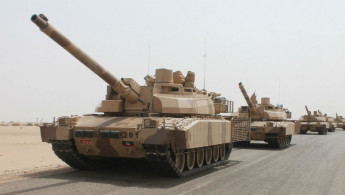Loyalists retake Yemen's biggest airbase
Pro-government forces backed by a Saudi-led coalition retook Yemen's biggest airbase from Iran-backed rebels on Tuesday in a significant new gain after their recapture of second city Aden last month.
Their seizure of the al-Anad base in a 24-hour assault using heavy armour supplied by the coalition came after hundreds of Gulf Arab troops landed in Aden to bolster the loyalist fightback.
Hailing victory in the battle for al-Anad, the defence ministry vowed there would be no let-up in the war against the Shia Houthi rebels and their allies until the authority of exiled President Abedrabbo Mansour Hadi was restored over the whole country.
The al-Anad base, 60 kilometres (40 miles) north of Aden, is strategically located on the main road north towards both the battleground third city of Taez and the rebel-held capital Sanaa.
The vast 15 square kilometre (six square mile) complex housed US troops overseeing a drone war against Al-Qaeda in Yemen until shortly before the rebels overran it in March.
Its loss is a major blow for the rebels, whose leader Abdulmalik al-Houthi claimed just Sunday that their ouster from Aden after four months of ferocious fighting was just a "short-term" setback that would be reversed.
Pro-government sources said that the rebels lost 70 dead and 10 captured in the fighting for al-Anad.
The loyalists suffered 24 dead and 23 wounded.
Officers who took part in the assault said that the rebels had put up "stiff resistance" but that Saudi-led air strikes had helped destroy their armour.
The loyalists had deployed hundreds of troops and militia equipped with tanks and armoured vehicles supplied by the coalition.
Coalition troops on the ground
| Aden has been devastated by four months of coalition air strikes and fighting on the ground. |
The recapture of al-Anad is a major boost for the defence of Aden and paves the way for a possible return by the exiled government to the southern port which was its last refuge before it fled into exile in neighbouring Saudi Arabia in March.
On Sunday, hundreds of Gulf Arab troops from the coalition entered Aden with tanks and other armour "to help secure" it, a military source told AFP.
The Saudi-owned Al-Hayat newspaper said 1,500 troops, most of them from the United Arab Emirates, had deployed to the city.
Aden has been devastated by four months of coalition air strikes and fighting on the ground.
The city is badly scarred, with gutted buildings and broken sewage pipes. It also lacks water and electricity supplies.
Aid has trickled in since pro-government forces forced the rebels out, and distribution of desperately needed relief supplies has begun.
The airport reopened on 22 July, allowing planes to land with supplies from Saudi Arabia, the United Arab Emirates and Qatar.
The United Nations says the war has killed nearly 4,000 people, half of them civilians, while 80 percent of the 21-million population needs aid and protection.
The Horn of Africa nation of Djibouti across the Gulf of Aden appealed on Monday for aid after a new influx of refugees from the Yemen conflict.
Almost 10,000 Yemenis - many wounded - have arrived in the small state since late March, according to the UN refugee agency.
Despite losing Aden, the rebels remain in control of large swathes of Yemen, including the capital, which they overran last September.
The UN has called repeatedly for a ceasefire and hosted peace talks in Geneva in June.
But the talks collapsed without the warring parties even sitting down in the same room.
The exiled government said it would only discuss a rebel withdrawal from all of the territory they have seized since last year in line with a resolution adopted by the UN Security Council in April.
The rebels said they could not do that as it would create a security vacuum that would expose them to jihadist attack.
Sunni extremists from both al-Qaeda and the Islamic State group have carried out deadly attacks against the Shia rebels and their supporters, whom they regard as apostates.





 Follow the Middle East's top stories in English at The New Arab on Google News
Follow the Middle East's top stories in English at The New Arab on Google News


![22 Arab countries at COP29 have rejected the targeting of fossil fuels [Getty]](/sites/default/files/styles/image_330x185/public/2024-11/GettyImages-2184289638.jpg?h=199d8c1f&itok=ptHl5bec)